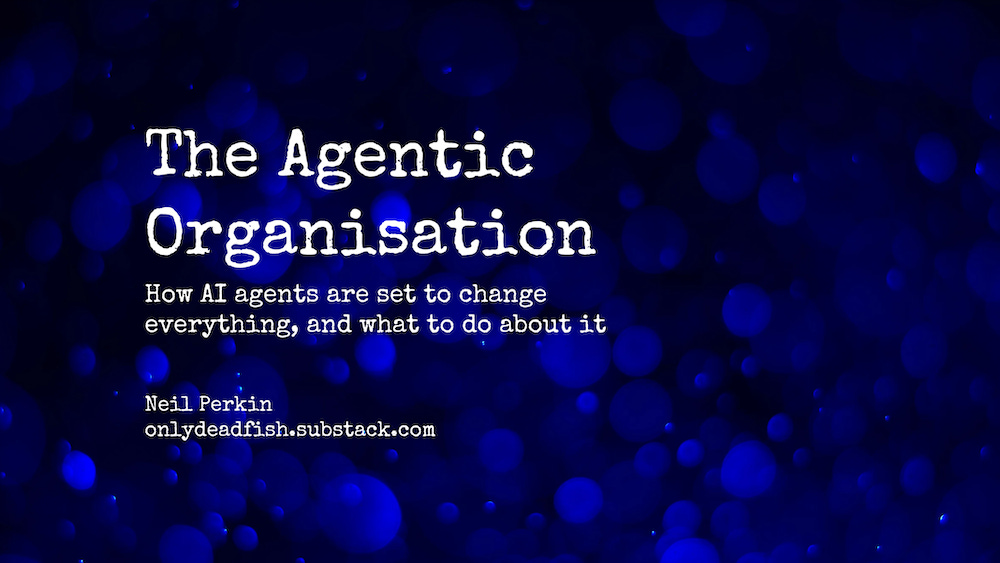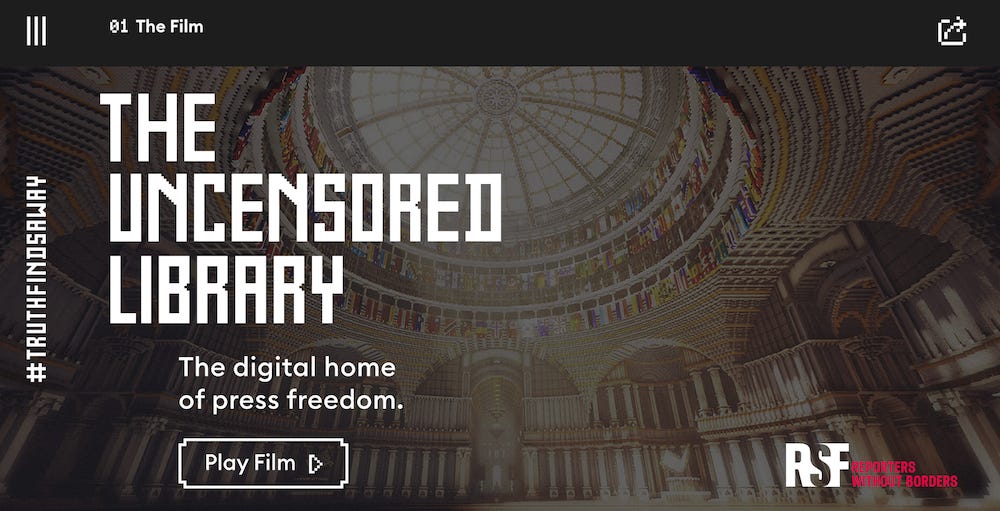Fish Food: Episode 633 - The Agentic Organisation (redux)
New thinking on designing for agentic AI, why LLMs will never truly be like humans, GPT 4.5, psychology in AI product design, and the Uncensored Library.
This week’s provocation: The Agentic Organisation (redux)
I fully believe that AI agents are going to upend everything from organisation design, to strategy formulation and execution, to workflows, to how people get stuff done. I think it will bring such fundamental change that we need to start thinking now about how we can take a more deliberate approach to designing for agentic AI, rather than just allowing it to happen.
So over the past weeks I’ve been researching and exploring the topic. I want to understand how this is likely to play out. And as someone that works with clients to manage change and transformation and to effectively navigate emerging technologies and possibilities, I think it’s essential that I have a point of view on this.
A month ago I started to write up some of my thinking around what an agentic organisation might look like. But as I’ve gone further into the topic it’s somewhat blown my mind. There is just so much to think about here.
As is my way, I started to collect together and write about some of the critical areas of change as a way to organise my thinking. And it became a presentation - a manifesto (of sorts) for how I think we should go about this. It begins with some context, and ways of thinking about significant technological-driven change, before defining agentic AI, considering how it will emerge, what it will mean for strategy and strategists, and then how we can design for a new type of organisation in a deliberate way.
You can view the presentation here (free to view). I’d love to know what you think of it, and if you find it useful do please share it.
If you do one thing this week…
This podcast was one of the most fascinating conversations about media, the state of content, AI and thinking that I’ve listened to in a long while. So much of interest in it, including ‘vibes and aesthetics’ in modern media, why LLMs hallucinate, content that adapts to the user, and why LLMs will never truly be like humans. I was listening to it in the gym and I had to keep stopping the cross trainer to take notes! YouTube link here, or it’s ‘Discourse Brunch’ on your podcast app (HT Ian Leslie)
Links of the week
OpenAI has just released it’s newest model GPT 4.5. Said to have better writing capabilities, world knowledge and a refined personality (whatever that means). Meanwhile Anthropic has introduced its most advanced AI model, the Claude 3.7 Sonnet, featuring a hybrid reasoning approach (an ‘extended thinking mode’) that combines multiple methods to solve complex problems. I’m reminded of analyst Ben Evans’ post about whether better models are actually better.
This was a fascinating dive into how consumer psychology informs AI product design, talking about concepts like the IKEA Effect (people value things more highly if they’ve had a hand in creating them), the bandwagon effect and the paradox of choice
This week the UK government closed their consultation on copyright and AI, and 1,000 musicians came together to release a silent album in protest at government plans to let AI companies use copyright-protected work without permission. Margaret Heffernan wrote the best thing I’ve read on this topic, making some great points about why artists should be paid and the risks associated with denigrating artist’s work and the humanities in general
Speaking of Margaret Heffernan, I also liked what she had to say about why incentives so often lead to unintended consequences (and why they are the ‘drug of choice’ for executives). My own favourite example of this (which I wrote about in one of my books) is the French colonialists who, in 1902 Hanoi, tried to reduce the rat population in the city to avoid a potential outbreak of bubonic plague. They offered payments to anyone that handed in rat’s tails as evidence, only to find that whilst the total rat population failed to decline, the numbers of tailless rats in the city ballooned.
And speaking of AI agents, Scott Brinker had a really smart take on how these are likely to revolutionise how the marketing tech stack is organised and accessed
This was an interesting example of using ChatGPT’s live voice and visual search in a retail store
‘If humanity lives in an otherwise barren Universe, we’ll have to forge philosophy that fills the void’. Thought-provoking read of the week - What if we’re alone?
And finally…
This week (via my daughter) I learned about The Uncensored Library - a virtual library built within the video game Minecraft (created by Reporters Without Borders) which is designed to combat censorship by providing access (as Minecraft ‘books’) to banned articles and journalistic works from countries with limited press freedom. Amazing.
Weeknotes
This week has been quite workshop heavy, with virtual workshops on AI for Canon, and ones on adaptive leadership for PwC. Plus I’ve been working away at my missive on Agentic AI. Next week I’ll be doing more AI with Canon, but also popping along to the Richmond Digital & AI forum which I curated this year.
Thanks for subscribing to and reading Only Dead Fish. It means a lot. This newsletter is 100% free to read so if you liked this episode please do like, share and pass it on.
If you’d like more from me my blog is over here and my personal site is here, and do get in touch if you’d like me to give a talk to your team or talk about working together.
My favourite quote captures what I try to do every day, and it’s from renowned Creative Director Paul Arden: ‘Do not covet your ideas. Give away all you know, and more will come back to you’.
And remember - Only dead fish go with the flow.








Love the thinking in Agentic Org, crystalized lots of brilliant minds thoughts into well balanced rallying cry, tempered with healthy dollop of pragmatism.